Engage in AccessComputing
Students with disabilities:
- Internships
- E-mentoring
- AccessComputing Team
- Summer programs
Educators & employers:
- Host an intern
- Communities of practice
- E-mentoring
- Minigrants
This page features all the articles from the AccessComputing News - January 2013 newsletter. This newsletter can also be viewed article by article on the AccessComputing News - January 2013 page.
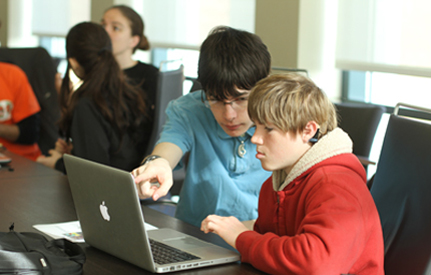 Since 2006, the Alliance for Access to Computing Careers (AccessComputing) has supported activities nationwide in order to increase the number of people with disabilities, including post-9/11 veterans, successfully pursuing computing careers. AccessComputing minigrant funds have been used to expand existing computing events to involve students with disabilities, create new stand-alone events designed to attract and support students with disabilities into computing fields, and support professional development opportunities.
Since 2006, the Alliance for Access to Computing Careers (AccessComputing) has supported activities nationwide in order to increase the number of people with disabilities, including post-9/11 veterans, successfully pursuing computing careers. AccessComputing minigrant funds have been used to expand existing computing events to involve students with disabilities, create new stand-alone events designed to attract and support students with disabilities into computing fields, and support professional development opportunities.
For AccessComputing minigrant success stories, visit www.uw.edu/accesscomputing/kb.html. To submit a proposal, consult www.uw.edu/accesscomputing/minigrant.html.
AccessComputing has funded over 140 internships for students with disabilities to work on research as well as lab, technical support, and other computing projects. Through these experiences, students have learned how to request reasonable accommodations, communicate with supervisors and co-workers, collaborate with others, and manage priorities. As one student shared, "despite being visually impaired, I can continue to work toward a degree in software engineering. My confidence level has increased along with my determination."
Research projects include:
Paid interns include:
AccessComputing has limited funds to support internships for members of the AccessComputing Student Team. Team Members also participate in mentoring and receive support from AccessComputing staff. Visit www.uw.edu/accesscomputing/team_app.html for more information and an application.
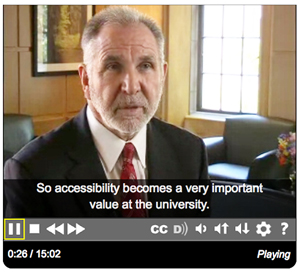 AccessComputing's new video, titled IT Accessibility: What Campus Leaders Have to Say, features university presidents and chancellors, chief information officers, and other information technology (IT) leaders sharing their thoughts and strategies related to IT accessibility in higher education.
AccessComputing's new video, titled IT Accessibility: What Campus Leaders Have to Say, features university presidents and chancellors, chief information officers, and other information technology (IT) leaders sharing their thoughts and strategies related to IT accessibility in higher education.
The video premiered at the November 2012 national conference hosted by EDUCAUSE, a nonprofit association of IT leaders and professionals committed to advancing higher education. Some of the video's participants were on hand to offer a few additional remarks and answer questions about the importance of building and buying accessible technology. The video and event were covered in The Chronicle of Higher Education and provided the stimulus for EDUCAUSE president Diana Oblinger to issue a call for senior higher education leaders to "begin a dialog on how their institutions can more effectively achieve IT Accessibility."
The video is available on YouTube as well as the DO-IT Video website at www.uw.edu/doit/video/itaccess.
What might be the first response of a professor when a student who is deaf enrolls in her computing class? Would she look forward to the unique perspective this student brings to the class, or only be concerned about what accommodations might be necessary? An important step to creating a classroom environment that is welcoming to all students is to value diversity in all of its many forms—to see, in this case, differences in hearing abilities as a normal, interesting part of the human experience.
Originally applied to the development of physical spaces, technology, and consumer products, universal design (UD) has more recently emerged as a paradigm for the development of instruction, curriculum, and assessment that are welcoming and accessible to students with a wide range of characteristics, including those related to gender, age, race, ethnicity, native language, and disability. The UD philosophy encourages instructors to apply a mix of teaching and assessment strategies. This proactive approach potentially reduces the need for disability-related accommodations and benefits many students, including those with undisclosed disabilities and those for whom English is a second language.
UD can contribute to research and practice in many ways, that include the following:
For more information on this topic, consult my recent article in ACM Transactions on Computing Education, Vol. 11, No. 3, Article 19, October 2011. In it, I share specific strategies that apply UD to course syllabi, web resources, teaching methods, presentation materials, labs, and assessment instruments.
Eleven deaf and hard-of-hearing students from Seattle-area high schools participated in the Saturday Computing Experience for eight weeks in spring 2012. Richard Ladner, PI of AccessComputing, led the class along with nine volunteers, including graduate students from the Computer Science and Engineering Department and staff from Google, Isilon and Microsoft. Three graduates of the Summer Academy for Advancing Deaf and Hard of Hearing in Computing and AccessComputing team members, Jordan Atwood, Josiah Cheslik and Travis Smith, served as teaching assistants. The program is funded by the Bill and Melinda Gates Foundation.
Students used Scratch, a visual tool for programming that uses blocks to string together commands and produce animation shorts and games. On the final day, students demonstrated what they learned to their parents, teachers, family members, and friends. Students' projects included an animated short that demonstrated technology for a person with a mobility disability and an interactive memory game.
In 2013, the Saturday Computing Experience will start on April 6. Applications are available for Seattle-area high school students who are deaf or hard of hearing. For more, see on the Saturday Computing Experience, see http://adhhc.cs.washington.edu/SCE.php.
The Workshop for Emerging Deaf and Hard of Hearing Scientists was held at Gallaudet University on May 17-18, 2012, with support from AccessComputing. The workshop brought together 97 participants, including high school, college, and graduate students as well as K-12 educators, sign language interpreters, university professors, and government staff involved in STEM fields.
Featured speakers included Dr. Harry Lang from the National Technical Institute for the Deaf at Rochester Institute of Technology, Dr. Becky Wai-Ling Packard of Mt. Holyyoke College, and Dr. Linda Campbell from St. Mary's University. Panels and breakout sessions provided an opportunity for in-depth discussion on the mentoring relationship between STEM students and faculty, resources for deaf and hard-of-hearing students in specific disciplines, and research experiences for undergraduates (REUs). Results of the event will be available on the AccessComputing website in 2013.
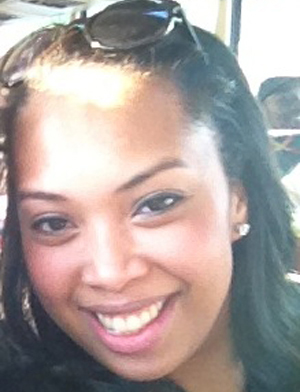 My name is Diana. I graduated last year from Georgia State University (GSU) with a bachelor's degree in Business Administration in Computer Information Systems and a Certificate of International Business. The IT field is always changing, and I excel in dynamic environments, so computing was a great fit for me.
My name is Diana. I graduated last year from Georgia State University (GSU) with a bachelor's degree in Business Administration in Computer Information Systems and a Certificate of International Business. The IT field is always changing, and I excel in dynamic environments, so computing was a great fit for me.
While I was in school, I completed an assistive technology internship with the Office of Disability Services at GSU. Assistive technology is used by individuals with disabilities in order to perform functions that might otherwise be difficult or impossible, thereby enabling them to be more independent. I currently work at a bank as an information security officer, and my goal is to transition to a government organization and conduct IT assurance work in addition to IT security.
My primary disability results from multiple surgeries to my right foot. I also suffer from chronic migraines and sleep apnea. My migraines affected my class attendance and would sometimes conflict with project due dates or final exams. My physical disability affected my class schedule and the routes I took to get to my classes. GSU is located in the heart of downtown Atlanta, and the city is not very wheelchair-friendly. I had to strategically plan my schedule based on classroom accessibility. I was able to succeed in my academic career thanks to the Office of Disability Services and the accommodations they provided me.
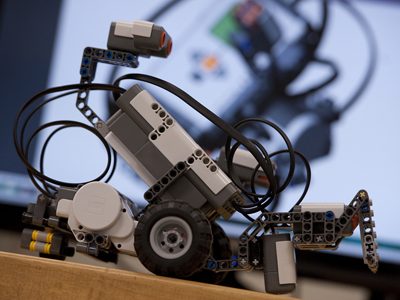 Summer 2012 brought a new learning opportunity for DHH students. For the first time, thanks to a subcontract from AccessComputing, the National Technical Institute for the Deaf (NTID) at the Rochester Institute of Technology (RIT) hosted a special two-week computing summer camp for DHH students called DRobotZ. The camp offered students a host of opportunities—including working with robots—all in the interest of persuading qualified DHH students to pick a path through high school that would lead them to a computing major in college.
Summer 2012 brought a new learning opportunity for DHH students. For the first time, thanks to a subcontract from AccessComputing, the National Technical Institute for the Deaf (NTID) at the Rochester Institute of Technology (RIT) hosted a special two-week computing summer camp for DHH students called DRobotZ. The camp offered students a host of opportunities—including working with robots—all in the interest of persuading qualified DHH students to pick a path through high school that would lead them to a computing major in college.
DRobotZ's goal is to encourage early high school students who are DHH and have an interest in and aptitude for computing and STEM. Participants meet deaf professionals, researchers, and college students. Students can learn about programs and careers in computing, and they can use science, mathematics, programming, and teamwork to solve problems. The camp was designed and managed by Mark Wambach. Karen Beiter served as the instructor.
The nine students who participated were very busy during their two-week stay. By day three, they were working with their robots, and by the end of the first week, students were having their robots carry out simple instructions and applying mathematics to their movements, controlling turns, measuring distances, calculating speed and acceleration, and testing friction.
Since camp ended, participants continue to stay involved; some have started a Facebook group, others have talked about taking honors classes, and one individual has pursued robotics projects independently using online materials provided by DRobotZ's director. For more on DRobotZ, see www.ntid.rit.edu/camps/drobotz.
In Summer 2012, AccessComputing began work to update its Web Design & Development curriculum. The curriculum, originally developed with funding from the National Institute on Disability and Rehabilitation Research of the U.S. Department of Education, is a project-based introduction to web design developed for use primarily in secondary schools, grades 9-12. The curriculum emphasizes standards-based and accessible design, and students learn to consider accessibility throughout the course as they learn and apply new skills and techniques.
The curriculum is available for free and since its debut in 2005, over 3000 teachers in all fifty U.S. states plus hundreds of teachers internationally have created accounts to access the instructor's version. Many of the teachers who use the curriculum have reported being tasked with teaching courses in web design as a secondary discipline, without necessarily having much expertise in web design. The curriculum therefore provides an opportunity for teachers to learn about accessible, standards-based web design and to pass that knowledge on to their students.
The current updates include all new lessons on HTML5, Cascading Style Sheets, and JavaScript, with accessibility-related content included in many of the lessons. Student projects, including a culminating project in which students develop websites for local clients, must pass HTML and CSS validation tests and semi-automated checks using free online accessibility checkers that students learn to use.
Approximately 200 classes nationwide participated in a Fall 2012 pilot using the curriculum, and AccessComputing staff is currently working with a small team of high school web design instructors to finalize the upgrade using feedback and feature requests collected during the pilot.
The upgraded version is available at www.uw.edu/accesscomputing/webd2.
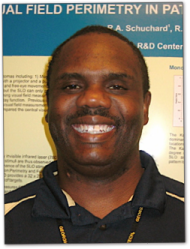 My name is Vincent. I have been using computers and computing systems to solve accessibility problems for more than twenty years. I'm currently working towards my master's degree in human-computer interaction (HCI) at the Georgia Institute of Technology in Atlanta, Georgia. After I graduate, I plan to attend a Ph.D. program in human-centered computing. HCI is a unique area in the computing field that studies the human perspective in the design and use of computing systems.
My name is Vincent. I have been using computers and computing systems to solve accessibility problems for more than twenty years. I'm currently working towards my master's degree in human-computer interaction (HCI) at the Georgia Institute of Technology in Atlanta, Georgia. After I graduate, I plan to attend a Ph.D. program in human-centered computing. HCI is a unique area in the computing field that studies the human perspective in the design and use of computing systems.
What I've enjoyed about graduate school is that I have the autonomy to study almost anything I want. Getting to know the other people that are in graduate school is what makes going to class and the lab every day a truly enjoyable experience.
I am blind, with only light perception. I have a genetic eye disease called retinitis pigmentosa that started to affect me in my early teens. At school, I have to help my professors remember that I cannot see any board that they are writing on. Getting them to routinely vocalize what they write is the most difficult task in any class. I stay ahead in all my classes to help me better understand the lectures. I read ahead and then visit with professors before they cover a topic. There are several classes in object-oriented programming languages that just are not accessible with screen reading programs. There are also several programming environments that have a lot of trouble working with screen readers.
To be successful, I utilize an enormous amount of assistive technology. I have an HIMS Braille Sense notetaker and a BrailleConnect Braille display, and I use the Freedom Scientific's OpenBook Reading System for scanning documents. I have five different screen reading programs: JAWS for Windows, Window-Eyes, HAL, Non-Visual Desktop, and System Access. I also have an Apple Mac-mini, iPad, and iPhone that all use the VoiceOver screen reading system.
Computing systems have allowed me to have a career and to solve a myriad of problems—most importantly allowing me to access information and increase my ability to communicate. I have also gained the skills to give people with visual impairments the tools that they need to navigate the visual world by applying technical and computing technology in the right manner.
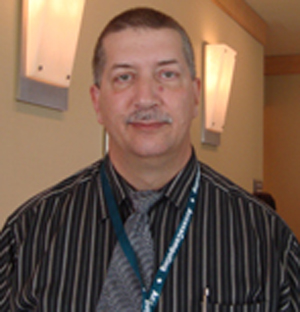 Mark Wambach, Assistant Professor at the National Technical Institute for the Deaf (NTID) at Rochester Institute of Technology (RIT), has been given AccessComputing's 2013 Capacity Building Award.
Mark Wambach, Assistant Professor at the National Technical Institute for the Deaf (NTID) at Rochester Institute of Technology (RIT), has been given AccessComputing's 2013 Capacity Building Award.
At NTID, Mark has served as coordinator of support services for deaf and hard of hearing students in RIT's Golisano College of Computing Studies for over fourteen years. In 2012, Mark ran DRobotZ, a computing-focused summer program for high school students who are deaf or hard of hearing from around the nation. For more on DRobotZ, see the article on p.5 of this newsletter.
Thirteen students attended the 2012 Summer Academy for Advancing Deaf and Hard of Hearing in Computing; 64 students have completed the Summer Academy during since its inception in 2007. The Summer Academy is an academically challenging program designed for students who are deaf and hard of hearing with skills in math and/or science who may be considering computing as a career. Students obtain college credits for attending a programming course and visiting tech companies in the Seattle area, including Adobe, Isilon, Google, Microsoft and Valve. They also learn about current research in computing and meet role models who are deaf and hard of hearing, who talk about their jobs as academic settings such as Rochester Institute of Technology. Students learn about careers and graduate study in computing.
Graduates of the Summer Academy have gone on to intern at companies like Cisco Systems, IBM, Microsoft and NASA; and some of the earlier graduates who have completed college are now working at Aurora Health Care and Microsoft. For more information on the Summer Academy, see www.uw.edu/accesscomputing/dhh/academy.
Administrators at Purdue University are working to raise awareness of web accessibility issues and educate employees on how to create websites that are accessible to individuals with a broad range of disabilities. The campus-wide Web Accessibility Committee (WAC) drafted a campus Web Accessibility Policy, created and maintained a website containing web accessibility information and resources, and developed and delivered Accessible Web Design training sessions.
After instituting the Web Accessibility Policy, the WAC and the Office of Institutional Equity received many requests for training on how to make PDF documents and forms more accessible to individuals with disabilities. In response, WAC held a series of workshops that used a train-the-trainer model to empower individuals across campus to improve accessibility and share their expertise with others.
Purdue applied for an AccessComputing minigrant to fund expenses for Terrill Thompson, AccessComputing Technology Accessibility Specialist, to provide hands-on training and lecture-based instruction. Thompson led train-the-trainer sessions for WAC members, and several sessions on PDF accessibility open to all faculty and staff. Attendees agreed to assist with subsequent trainings and to be resources in their academic departments or administrative units. When participants were asked to describe how they intend to implement what they have learned, many individuals described extensive plans. They included fixing PDF documents already online, integrating information into resources related to web design, creating training materials for departmental staff, and sharing the information with students.
The training sessions were recorded to reach those who could not attend. Recordings have been closed captioned and posted on the WAC website, allowing regional campuses to link to the training videos directly or post them on their own websites. More information on Purdue's Web Accessibility efforts is available at www.purdue.edu/webaccessibility/.
You can find more information about applying for AccessComputing minigrants to support training, experiential learning, and other computing and information technology (IT)-related activities at www.uw.edu/accesscomputing/minigrant.html.
Connect to AccessComputing project information, resources, and materials.
www.uw.edu/accesscomputing/knowledge-base.html
Consult Q&As, case studies, and promising practices regarding universal design of instruction; strategies for making computing curricula, classes, labs, and careers accessible; and accessible technology for people with disabilities.
Open-captioned and audio-described videos are available freely online for streaming or download and DVDs are also available for purchase.
www.washington.edu/doit/resources/brochures
Publications are available online or in print format for free or low cost.
Led by the Department of Computer Science & Engineering and DO-IT (Disabilities, Opportunities, Internetworking, and Technology) at the University of Washington, AccessComputing is supported by the National Science Foundation (Grant No. CNS-0540615, CNS-0837508, and CNS-1042260). Any opinions, findings, and conclusions or recommendations expressed in this material are those of the authors and do not necessarily reflect the views of the National Science Foundation. For further information, to be placed on the mailing list or to request materials in an alternate format, contact:
University of Washington
Box 354842
Seattle, WA 98195-4842
accesscomp@uw.edu
www.uw.edu/accesscomputing/
206-221-4171 (Fax)
206-685-DOIT (3648) (voice/TTY)
888-972-DOIT (3648) (toll free voice/TTY)
509-328-9331 (voice/TTY) Spokane
Dr. Richard Ladner, PI
Sheryl Burgstahler, Co-PI
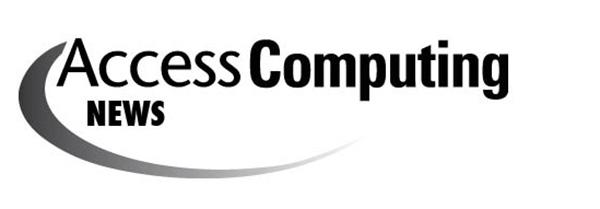
Below are the articles of the AccessComputing News January 2013 newsletter. These articles can also be seen all on one page at the Full Newsletter option.
To see other newsletters in the full format, visit AccessComputing News (All Articles) List.